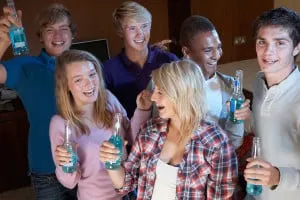 A surprising amount of teens easily acquire alcohol from adults, even their own parents. In a 2005 American Medical Association (AMA) study of teens between the ages of 13 and 18, one in three teens reported that they easily obtain alcohol from their own consenting parents while 40 percent easily obtain it from a friend’s parent. One in four teens further reported that they had attended a house party where minors were drinking in front of parents.
A surprising amount of teens easily acquire alcohol from adults, even their own parents. In a 2005 American Medical Association (AMA) study of teens between the ages of 13 and 18, one in three teens reported that they easily obtain alcohol from their own consenting parents while 40 percent easily obtain it from a friend’s parent. One in four teens further reported that they had attended a house party where minors were drinking in front of parents.
You might think that supervising underage drinking parties will keep your teens safe from the effects of alcohol or the law, but teen drinking parties can quickly get out of control – and if the police show up, social host liability laws make you responsible for allowing underage drinking.
A social host is an adult who knowingly or unknowingly hosts a party where alcohol is served on property they own, lease, or control, such as a house. Social host liability laws hold such adults responsible if guests under the age of 21 are served alcohol, regardless of who provided it. Determining who provides teens alcohol at a party can be difficult for law enforcement officers. However, social host liability laws provide law enforcement with an adult to hold accountable. Consequences can include fines, jail time, administrative fees, response costs, and/or the cost of any damages or injuries.
According to Mothers Against Drunk Driving (MADD), 24 states and 150 cities or counties in the U.S. have enacted a social host liability law, which has reduced binge drinking, drinking and driving, and even drunk driving mortality rates, especially among underage drinkers.
Social host liability laws can also hold commercial servers legally and financially liable for serving alcohol to anyone who is obviously intoxicated and is later killed or injured or kills or injures another person in his or her impaired state. In some states, such liability is enforced under dram shop laws.
To learn more about social host liability laws, check out MADD’s educational social host brochure.
